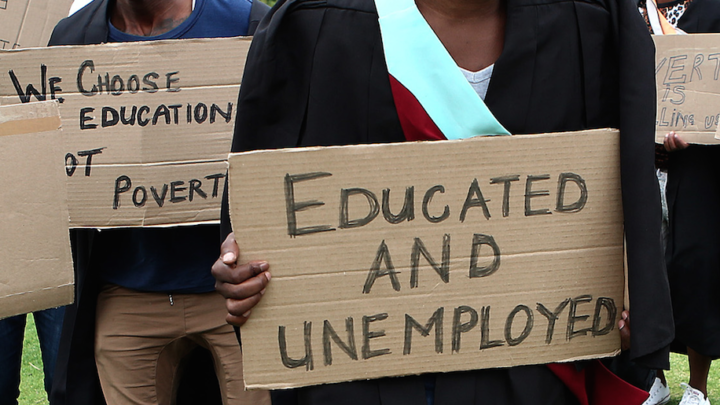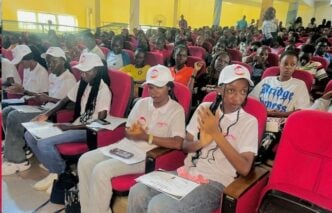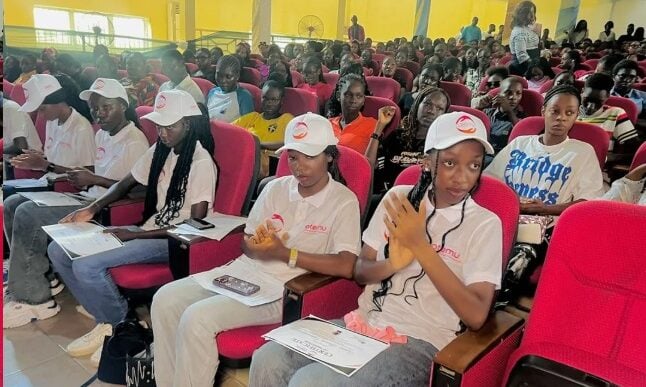(Being an excerpt from the 17th convocation lecture of Bells University of Technology, Ota, Ogun state, delivered in the BUT Auditorium on Friday, October 31, 2025).
Convocation ceremonies that universities and other tertiary institutions hold to celebrate the achievements of their graduands are more than mere ceremonies. They are signifiers of a significant event about to take place. That event has to do with the need to reconnect the talents, ideas and theories that have been grown and cultivated within the higher education context to back up the societal base of that knowledge framework. When universities graduate students in all cadres, they are making a fundamental statement about the need to give back to the society that initiated the needs for those institutions in the first place. Universities and tertiary institutions cannot stand off the knowledge production objective that called them into existence in the first place. They exist not just as ivory towers generating knowledge for knowledge’s sake; rather, the knowledge generated is supposed to lead to the emancipation of lives and the transformation of societies. Convocations are therefore testaments to significant achievements as well as statements of new and transformatory beginnings.
This makes the 17th convocation ceremony of the Bells University of Technology (BUT) – the first private university of technology in Nigeria – a serious event for many reasons. The first is obvious. BUT is a specialized university—much like the Federal University of Agriculture, Abeokuta, Federal University of Technology, Akure, University of Petroleum Resources, Effurun, the University of Medical Sciences, Ondo, etc.—that came into existence for specific developmental purposes in ways that are different from the conventional universities and tertiary institutions. The second reason speaks to the founding of BUT that connects vision and statesmanship to national development. This reason allows me to pay deep homage to one of the fathers of the Nigerian nation, an elder statesman emeritus, our living legend, and the visitor to this revered university, Chief Olusegun Okikiola Obasanjo, GCFR, PhD, and former president of the Federal Republic of Nigeria. There are no enough words to capture the deep essence of a statesman, nationalist, and visionary, who sees far ahead of his time. Indeed, the founding of Bells University is one stroke of foresight that uniquely connects OBJ’s leadership vision, development insights and patriotic love to the greater Nigeria’s emerging future.
The concern of BUT with youth unemployment and skills mismatch as the theme of its 2025 convocation lecture and its 20th anniversary, says a lot about its capacity to stay ahead of its vision and mission as a leading higher education stakeholder in Nigeria. In this piece, therefore, my objective is to connect Nigeria’s development challenges with the deficit and dysfunction of higher education, especially in terms of human capital development and the resulting unemployment and skill deficiency. I will explore several ways by which this challenge could be alleviated, especially by specialized universities like BUT and other conventional universities across Nigeria. I sincerely hope this reflection will be able to spur the universities and other tertiary institutions to even greater efforts in pushing Nigeria towards sustainable development.
Advertisement
The first crucial foundation to lay is the acknowledgement that the world has arrived at the knowledge society. This is a society that speaks to the importance and the qualitative role that knowledge has come to play in the defining of our time and its possibilities. It concerns the dynamic of how knowledge is efficiently applied to every facet of human socioeconomic life, from civil society and the economy to politics and the community. This society emerged, according to Peter Drucker, because “Knowledge is being applied to knowledge itself…. Knowledge is now fast becoming the one factor of production, sidelining both capital and labor.” It does not take any significant reflection to immediately see why education is a very crucial element in the making and functional reality of the knowledge society. Or why institutions of higher education, especially the universities, are key to generating knowledge that the society and state can deploy to generate wealth and make economic and developmental progress. In the knowledge society, Drucker insists that it is not only learning that is fundamental, but “learning how to learn.” In this sense, the universities become the critical space within which learning, education, innovation and information become mixed in a dynamic and strategic form that conduces to the benefit of the human society. The university then becomes not only a site for knowledge production, but also a space for fashioning the human capital that could be called upon to process the knowledge that is produced for the betterment and improvement of the society.
The challenge for a state like Nigeria is that we have found it difficult to step into the knowledge society, except as a default event, because higher education is disarticulated from national development given that human capital development has failed to meet up with the creative innovation that many nations have fully recognized and invested in so heavily, in order to guarantee sustainable progress. The higher education dynamics therefore become extremely significant in terms of their relationship with a nation’s productive force. Unfortunately, Nigeria has failed so far in tapping into its youth bulge—the number of Nigerians that fall within the productive age of fifteen to thirty-five years that make up the productive age—which makes her the most youthful country in Nigeria, and one of the largest in the world. The human capital development dynamics are then compromised by a gloomy statistic of youth unemployment: According to the National Bureau of Statistics, the labour force survey for 2023 reveals, for instance, that youth unemployment increased from 6.9% in the first quarter of 2023 to 7.2% in the second. The youth not gainfully employed, in school or in any form of training amounts to 13.8%. The informal economy employs a whopping 92.7% Nigerians. Then there is a mass of unemployable and restive youth population that has transformed the youth bulge into a negative fact. In other words, Nigeria’s higher education has failed so far in tapping into the youth bulge to generate a creative, knowledge and innovative productive force that Nigeria can then harness for its developmental needs.
For me, there are three functions a university ought to pursue vigorously. The first is to connect students with their humanity—to make them more humane than when they stepped through the gates of the university. This, for me, is the crucial responsibility of the humanities, from History and Philosophy to Music, Religious Studies and Classical Studies. The second function of the university is to inculcate the best insights into citizenship in ways that enable the Nigerian polity to benefit from those who are able to achieve patriotism through a serious engagement with the body politic. I lay this responsibility at the feet of the social sciences, especially sociology and political science. The third function of higher education that the university embodies is to arm the students with relevant and cogent skills and competences that will not only tide them for life, but will also become the tools they need to move the nation forward. This is where the science, technology and management faculties come in. It is pretty difficult to disarticulate the functions of the university in this manner, but I will take the risk and examine the third function here.
Advertisement
These three functions imply that a university like BUT cannot just be fixated on crunching ideas, paradigms and theories that are not grounded on praxis. This sensitizes us to the fundamental significance of the town-and-gown. Indeed, the town needs the ideas and theories of the gown, as much as the gown also requires to reorient its theories by the practices of the town. This articulates the necessity of connecting theorizing to the imperative of industrialization and national development for a country like Nigeria. The paradox of the Nigerian developmental situation is that despite the millions of graduates that Nigerian universities churn out every year, she still could not manage an adequate industry-ready manpower that could qualitatively transform her development and productivity profile. This is the crux of Nigeria’s development predicament. There is a simple explanation for this predicament of the unemployed and unemployable: the education they got did not make them relevant as key elements of the development planning and even entrepreneurial process. There is therefore a skill mismatch when a student’s training and education fail to meet the requirements and needs of the country’s labor market and industries.
There are three dimensions of this skill mismatch. One, there is the skill gap that is the consequence of the curriculum being oriented on too much theoretical rather than practical knowledge and skills that meet specific societal and developmental needs. Two, there is the field-of-study mismatch that is the result of graduates getting trained in disciplinary areas not needed by the Nigerian economy. And lastly, there is the qualification mismatch that implies that graduates are underqualified for available jobs or are even unemployable for them. This skills mismatch is aggravated by two factors. One, there is the incapacity of past reforms to restore the functional link between education, job creation and employability of graduates. Two, there is also an educational philosophy which is skewed in favor of formal education to the exclusion of technical, vocational education and training (TVET) as well as the more traditional apprenticeship and other non-formal training like the Igbo apprenticeship system as part of a larger framework for generating and consolidating nationwide job creation and entrepreneurial dynamics that underlie human capital development.
The objective therefore, going forward, is for the government to set a policy objective that connects higher education, industry and development. In order to match certification and qualification generated by educational and training institutions with employment opportunities available in the labour market, development policies need to not only connect the formal and informal education subsector, especially in terms of the students’ industrial work experiences, like SIWES. The recent and ongoing efforts of the Federal Ministry of Education to implement several programs that promote STEM education and foreground TVET is commendable. So also, is the decision of the African Development Bank (AfDB) to provide crucial support to 38 technical colleges, to enhance skills acquisition and vocational training. This significantly possesses the capacity to fully activate the national vocational qualifications framework (NVQF) as standardized certification for skills to promote employability and industry relevance.
The federal government might need to consider declaring a state of emergency on the education sector especially in terms of the development imperative of generating new skills that match the twenty-first century technology-driven transformation of the nature of work and the imperatives of productivity. Universities and other tertiary institutions must emphasize digital skills (i.e. machine learning and AI), technical skills (i.e. cloud computing), soft skills (i.e. critical thinking), lifelong skills (i.e. adaptability and resilience), vocational skills (i.e. data analytics, social media management), among others. These skills acquisition imperative draws the universities, especially specialized ones like BUT, into the larger reform framework. This involves (a) transforming the development nature of their governing councils in ways that affect the fundamentals of curriculum development and pedagogy; (b) strengthening the university-industry synergy and collaboration through the establishment of research and development hubs; (c) creating enabling atmosphere and programs that enable students develop creative start-ups and entrepreneurial innovation; (d) be a significant part of a tripartite labour arrangement involving ASUU and the government that functions on a development rather than adversarial industrial relations dynamics.
Advertisement
In concluding this piece, I like to digress to dwell a bit on why the government, industry and labour must come to a shared vision and purpose to create industrial harmony as growth enabler, in spite of the usual inescapable periodic conflicts which will of course play up from time to time between government and labour unions; conflict situations that must be seen to be managed and resolved within the framework of the rule of law and constitutional order, and not the disarticulated government handling and militancy-propelled unionism, a subsisting culture carried over from the era of military rule.
The point is that the Nigerian industrial relation system is currently at a critical inflection point. It is one characterised by fragmentation, weakened institutional mechanisms and authority of responsible institutions as the ministry of labour and employment, Industrial Arbitration Panel and the National Industrial Court (NIC), whose authorities are disdained with impunity by the unions, especially as such disdain seems to be the only language that unions have come to see as the one that moves government especially to take action in the heat of collective bargaining, This tradition having become a paradigm of worrisome zero-sum incessant conflicts that lead to prolonged and unnecessary industrial disputes and the dishing out of morsels of token concessions that never add up nor address the fundamental welfare and deeply structural and systemic issues being pushed especially by ASUU.
It is significant to note that there has been progress made to ratify and domesticate many relevant ILO Conventions that have direct impact on labour administration. Full compliance with these conventions will go a long way in shaping the future of work in Nigeria. Going forward, we however need a shared understanding among the tripartite, one rooted in commitment to Nigeria’s developmental progress, to drive a significant rethink and shift in conflict management practices around industrial disputes which currently yield itself to self-serving radical and ostensibly politicised activism and workplace disruptions by trade unions; and one at that which has become a culture. The fact is that there exist institutional mechanisms to deal with unavoidable and seemingly irresolvable disputes especially arising from the reading and interpretation of what constitute disputes of rights and disputes of interests among the tripartite. Clearly, if national progress is the ideological underpinning of actions, then conflict of interest should not always degenerate into a zero-sum game, as such interests are not mutually exclusive.
So, what lesson should be draw as policy makers, development workers and public managers from the ASUU protracted struggle, going forward: One, government should for no reason at all, sign an agreement that it cannot implement, as difficult as it is in view of the usually associated political expediencies. Two, governments in the bid to please unions and minimise heating up of the polity, should desist from taking decisions of far-reaching magnitude in a hurry, with full recognition that labour matters require diligence and technical correctness. It is better to agree to a reasonable agreement with short-term horizon and susceptible to reviews, than to make long-term commitments that hang on the neck of government like an albatross. Government should give life to veritable institutional mechanisms that will activate people with the right authority, skills and technical support to be those who will negotiate for government since they are ipso facto empowered to take decisions at negotiation table.
Advertisement
It is in this regard, that advocacy around the need to strengthen the National Labour Advisory Council (NLAC) to play more proactive role in labour administration should be taken seriously by government. Indeed, an effective NLAC that transform into a tripartite body to handle periodic reviews as minimum wage, etc, rather than current recurring resort to ad hoc committees is critical to success going forward. It must also be pointed out that most Nigerian Labour Laws presently in operation which are carried over from the colonial and military era in Nigeria are obsolete, and no longer in tune with international standard. Happily, many of the revised versions of these laws are already before the National Assembly as bills for passage.
It is expected that government will leverage the commitment of social partners to conclude legislative actions on the bills. In the end, the point cannot be overstated, that the health and sustainability of any enterprise (including the Nigerian enterprise) is the responsibility of all stakeholders. Indeed, we need a national economy that is thriving for most of what the trade unions are agitating for on behalf of workers to be realisable. We all therefore must invest in the productivity and sustainable development of the Nigerian enterprise as the overarching mission in all our struggles and campaigns,
Advertisement
Overall, Nigeria’s development future depends on a higher educationly ajectory that grounds human capital development not merely on youths who graduate from the universities and earn certification, but on youths who keep learning and achieving skills that are contextual, developmental and lifelong. Proactive policy architecture is the point at which Nigeria meets the evolving society on a scale of skill acquisition that matters as knowledge and development leeway. This is when the Nigerian youth really begin to matter for Nigeria’s future.
Olaopa is a professor of public administration and the chairman of the Federal Civil Service Commission, Abuja.
Advertisement
Views expressed by contributors are strictly personal and not of TheCable.











